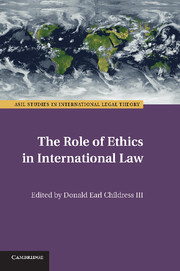Book contents
- Frontmatter
- Contents
- Contributors
- Acknowledgments
- Introduction
- Part one The Role of Ethics in Public International Law
- Part two The Role of Ethics in Private International Law
- Part three Normative and Theoretical Perspectives
- 9 Human Rights: Ethical, Political…or Legal? First Steps in a Legal Theory of Human Rights
- 10 The Ethic of International Law
- Index
- References
10 - The Ethic of International Law
Published online by Cambridge University Press: 05 December 2011
- Frontmatter
- Contents
- Contributors
- Acknowledgments
- Introduction
- Part one The Role of Ethics in Public International Law
- Part two The Role of Ethics in Private International Law
- Part three Normative and Theoretical Perspectives
- 9 Human Rights: Ethical, Political…or Legal? First Steps in a Legal Theory of Human Rights
- 10 The Ethic of International Law
- Index
- References
Summary
Introduction
A contemporary discussion of ethics in international law generally presumes a binary or dichotomous distinction between ethics and international law. Ethics would thus appear as environmental or human rights claims, for example, within an existing corpus of international law. These disparate ethical claims would be identifiable as alien, or at least distinct, intruders within the larger corpus. This binary distinction between ethics and law is difficult to avoid in the present Western world, without attempting neutral language or neologisms that fail to capture the nature of the discussion. It is possible, however, to blur the dichotomy to some measure (without escaping it entirely) by suggesting that ethical considerations do not somehow exist within international law, as a type of alien intruder, but both underlie and permeate international law itself. It would thus be appropriate to speak of the ethic, in the singular, of international law; this ethic, in the singular, would consist of the set of moral or normative principles that have controlled, and that continue to control, what we have known since Bentham as international law. The underlying ethic of international law is thus found primarily in the normative claim that justice, at the international level, is best defined in terms of the relations of states and not in terms of the relations of individual human beings. It is important, moreover, to recognize this as a normative or ethical claim, and not simply as a statement of the nature of international law. International law and its underlying ethic would thus exist in conflated form, and their ongoing success would depend on the normative grip of both. International law, accompanied by its underlying ethic, is therefore capable of engagement with novel or different normative claims. International law, even seen as positive law, would not constitute a bar or obstacle to the recognition of such claims as law, because its underlying ethic would provide a normative repository for engagement with them. International law would not exist as a normatively mute social fact.
- Type
- Chapter
- Information
- The Role of Ethics in International Law , pp. 246 - 270Publisher: Cambridge University PressPrint publication year: 2011
References
- 1
- Cited by

